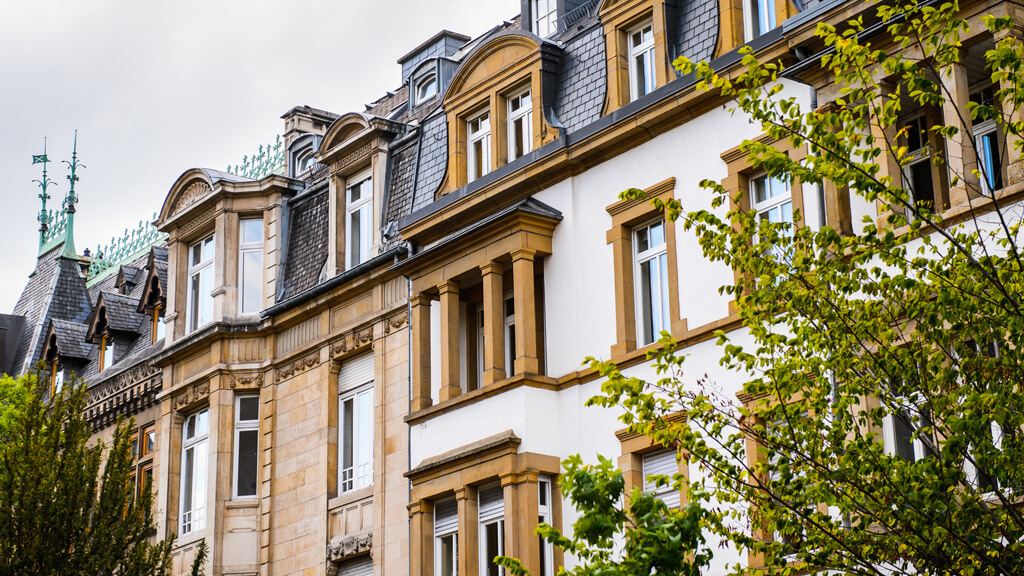Home > Blog > Home > Property market in Luxembourg: all you need to know
Property market in Luxembourg: all you need to know
Are you planning to move to Luxembourg and are you planning to buy a property? Allow plenty of time to find that rare gem, as demand far exceeds supply. You will also need a sizeable budget, because property prices are much higher than in neighbouring countries. Prices, help to buy and renovation subsidies, conditions to watch out for: we detail all these points for you in this article.

How much does property cost in Luxembourg?
Despite the country’s small size, prices vary greatly depending on the region in which you want to settle. At the beginning of 2024, the average price varied between €6,960/m² and €10,975/m². By way of comparison, in a city like Brussels in the same period, the average price of an apartment was €3,364/m² and that of a house was €3,166/m².
The North region is home to the most attractive prices, while the Centre region – the one in which Luxembourg City is located – is, unsurprisingly, the most expensive. Property sites such as Immotop.lu, wortimmo.lu and athome.lu regularly update the figures per square metre, by region and even by municipality.
Why is property so expensive in Luxembourg?
There are two simple reasons why property prices are so high:
- Average incomes in Luxembourg are the highest in the European Union.
- Demand exceeds supply.
The second point is directly related to the first, since high incomes make Luxembourg particularly attractive to foreign workers. They are the main contributors to the country’s population growth. Since 2010, the population growth rate has averaged between 1.4% and 2.5% per year. This compares to between 0.5% and 1% in Belgium, and just 0.3% to 0.5% in France.
The population is therefore growing much faster in Luxembourg than in neighbouring countries, but the construction of new housing is not keeping pace. The result: huge pressure on real estate. It is no coincidence that access to affordable housing is the main concern of Luxembourgers.
The good news is that since the end of 2022, after a period of unbridled growth, real estate prices have started to fall for the first time in at least fifteen years, i.e. since the Observatoire de l’habitat [Housing Observatory] started to publish these data.
Investing in property in Luxembourg: how do you go about it?
If these prices don’t put you off and you want to start looking at the property market, here’s some useful information:
- Most purchases go through agencies; sales between individuals are rare. Most of the properties available can be found on the aforementioned property websites: athome.lu, wortimmo.lu and immotop.lu. Looking for a more exclusive property? Contact agencies like Secretimmo and Nextimmo.
- If the property is to become your primary residence, you will need to register as a Luxembourg resident before you can acquire it.
- Need a mortgage? Banks often require a personal contribution of around 20% of the purchase price. Don’t forget to check for finding the best rates to reduce your monthly charges.
- Banks also require you to take out an home insurance policy before granting a loan.
- As elsewhere, the deed of sale will be drawn up by a notary.
What assistance is available for buying a house or apartment?
The public authorities have a number of schemes in place to give buyers a helping hand. Of course, they are granted under certain conditions and their amount varies according to the buyer’s personal situation. The reference site to obtain the most up-to-date information: logement.lu.
Here is an overview of the assistance available to you:
- The tax credit or “bëllegen Akt”: this tax incentive offsets registration fees of up to €30,000 per buyer (i.e. up to €60,000 for a couple). Please note that to take advantage of this benefit, you must live in the property for at least 24 months without interruption.
- The interest subsidy: this assistance is intended to reduce the monthly costs of repaying a mortgage. The interest subsidy rate can vary between 0.575% and 2.45%. It is set according to the income and family situation of the beneficiaries. The maximum amount to be subsidised is capped at €280,000.
- Interest relief: this allows you to obtain a 0.5% reduction in the interest rate per dependent child (up to a maximum of 3%) on your loans to build, renovate or improve your home.
- The construction premium: a premium of up to €9,700 (or even 30% more under certain conditions) to build your home in Luxembourg.
- The improvement premium: a premium corresponding to 40% of the total amount (excluding VAT) of invoices relating to improvement works in your home.
- The home ownership premium: a premium of between €500 and €10,000 (or €20,000 for newly-built homes), granted to people who have taken out a mortgage to buy a home located in Luxembourg and who do not own any other property.
- The savings premium: a premium of up to €500 per year for people who have taken out a mortgage to buy a home (already built or with construction under way) and have saved money to invest it in financing their home.
Tip: discover Foyer’s credihome mortgage offer
Buying property in Luxembourg: a good investment?
In theory, yes. It is true that if you buy a property in Luxembourg today, you are paying a high price after a frenetic period of housing inflation.
On the other hand, prices have been falling since the end of 2022. As elsewhere, it was the rise in interest rates that caused this fall, coupled with the loss of purchasing power among households and investors. But if you have the necessary capital, now might be a good time to buy? Because in “normal” times, property prices only rise in Luxembourg.
Renting: option B
If buying a property is ultimately out of your reach, renting is the logical alternative. Even if, unlike purchase prices, rents are not falling. In 2023, average rents were €1,500/month and up to €2,039/month in the centre of the country (Luxembourg-city region). By way of comparison, average rents in Brussels were €1,188 in 2023.
Also when renting, you will find most ads on the main property websites. If you are short of time and have the budget, you can also contact relocation agencies such as LuxRelo, which offers turnkey solutions for a stress-free move.
Finally, coliving – a kind of high-end flatsharing – is very fashionable in Luxembourg. This formula attracts many young expats looking for accommodation in the short or longer term.
How to insure your home
Have you found the home of your dreams? At Foyer, we offer the full range of insurance required to take out a mortgage, from home insurance to mortgage insurance.


